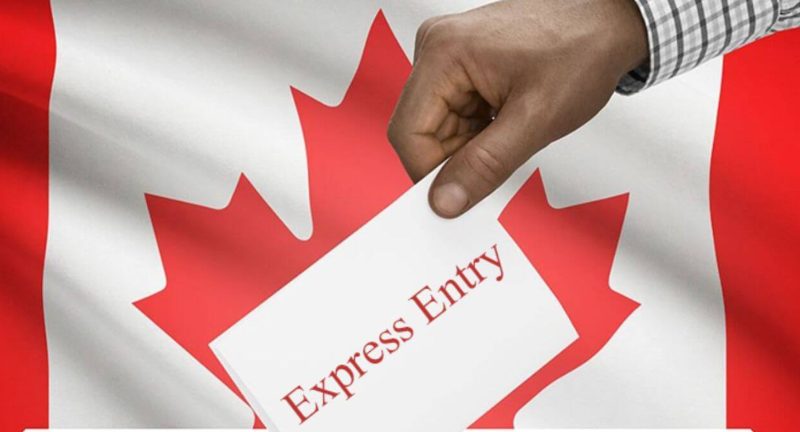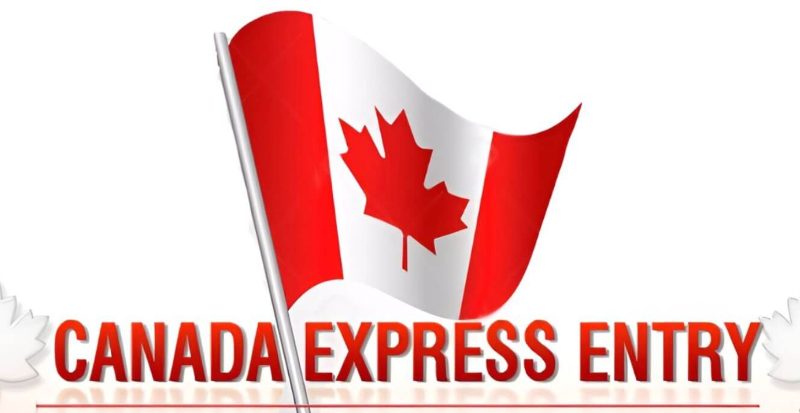Get free consultation
Fill out the form and we will contact you
The Canadian Express Entry immigration program has attracted significant attention from the global workforce. If you're looking to learn more about Express Entry, join Second Citizenship as we explore the details of this program, including how it works, the benefits it offers, popular program types, and the CRS (Comprehensive Ranking System) scoring system in the following article!
Express Entry (EE) is an immigration program initiated by the Canadian government in January 2015 to attract skilled foreign workers. The goal of the program is to select exceptional candidates to immigrate to Canada and contribute to the country's economic development.
In 2023, the program targeted 82,880 candidates and issued a total of 110,266 Invitations to Apply (ITAs). For 2024, according to the newly announced immigration plan, Canada is expected to welcome 110,000 foreign workers through Express Entry.
Immigration to Canada through Express Entry for Skilled Workers
Before the Express Entry system was introduced, immigration applications were processed in the order they were submitted, which sometimes led to high-potential applications being overlooked. However, with the launch of Express Entry, the Canadian government gained the ability to optimize the quality of applicants and minimize the approval of substandard applications.
Prepare Documents: Applicants need to gather important documents, including a passport, professional certificates, language test results (IELTS or TEF), work experience certificates, and other documents such as proof of finances and health insurance.
Submit Application Online: Applicants must create and submit their profiles online through the Immigration, Refugees and Citizenship Canada (IRCC) system. The profile should provide detailed and accurate information about skills, work experience, language proficiency, education level, and other factors required by the program.
Receive and Assess Application: The IRCC will receive and assess the application based on the Comprehensive Ranking System (CRS). The CRS score is calculated based on factors such as age, language proficiency, education level, work experience, and other related elements.
Enter the Express Entry Pool: After assessment, the application will be entered into the pool, and the IRCC will invite the highest-scoring candidates to apply for permanent residency through Invitations to Apply (ITAs) in subsequent draws.
Receive ITA and Prepare the Application: After receiving the ITA, applicants have 60 days to complete and submit their permanent residency application, along with all required documents and further details.
How Express Entry Works
Final Assessment: The application will undergo a thorough review by IRCC, which can take anywhere from several months to up to half a year, depending on the complexity of the application and the actual circumstances. Once the application is approved, the applicant will receive confirmation of their permanent resident status and can take the next steps to settle in Canada.
If you don't receive an Invitation to Apply (ITA) and are still in the pool, don't worry. You still have the opportunity to improve your CRS score by enhancing your language skills in English or French, earning additional certificates, diplomas, or degrees, applying with a spouse, or receiving a provincial nomination. After making these improvements, update your profile to increase your chances of being selected in subsequent draws.
The Comprehensive Ranking System (CRS) is a tool used to assess and rank candidates in Canada's Express Entry program based on a set of specific criteria. These criteria include personal factors, spouse-related factors, and the ability to transfer skills, among other factors. The main goal of the CRS is to identify the candidates who are most likely to succeed and meet the requirements of Canada's immigration programs.
CRS points are awarded based on the following criteria:
1. Age
Applicants between the ages of 20 and 29 will receive the highest score, up to 110 points. If applying with a spouse, they can receive up to 100 points.
2. Education
The maximum points for education are 150 points, based on post-secondary education programs.
3. Language Proficiency:
Language points are calculated based on four skills (listening, speaking, reading, writing), with a maximum of 136 points for a single applicant and 128 points for applicants with a spouse. Points for a second language can reach a maximum of 24 points for a single applicant and 22 points for those with a spouse.
4. Work Experience:
Points for work experience are a maximum of 80 points for five years of experience, with no additional points for experience beyond that.
Group A: Human Factors
Group B is based on factors such as the spouse or common-law partner's educational qualifications, language proficiency, and work experience in Canada. Specifically:
Education Level: 10 points
Language Proficiency: 20 points
Work Experience in Canada: 10 points
Note: The total points from Group A and Group B can reach a maximum of 500 points, regardless of whether the applicant has a spouse or common-law partner.
Group B: Spouse or Common-Law Partner Factors
Group C is used to assess candidates who have exceptional scores in at least two factors from Group A. The additional points in this group can be up to 50 points for 2 skills and 100 points for 4 skills.
Language proficiency and post-secondary education: 50 points
Work experience in Canada and post-secondary education: 50 points
Language proficiency (CLB 7 or higher) and work experience abroad: 50 points
Work experience in Canada and abroad: 50 points
Strong language proficiency and educational qualifications: 50 points
Note:
The factors in Group C apply only to the applicant, not to the spouse or common-law partner.
The total additional points from Groups A, B, and C can reach a maximum of 600 points.
Group C: Skill Transferability Factors
This group includes various important factors that affect the overall CRS score. One key example is the Provincial Nominee Program (PNP). Canadian provinces have programs linked to the Express Entry system (EE-PNP) to select candidates with skills, qualifications, and work experience that meet the labor needs of the province or sectors where the province requires additional workforce to support its economic development.
When a candidate receives a nomination from a province, they will receive an additional 600 points to their CRS score. This ensures that the candidate will be invited to apply for immigration in the next federal selection round.
By participating in the Express Entry program, you will enjoy several attractive benefits, including:
Fast application processing: Your application will be processed within six months from the submission date. In contrast, processing times for other programs such as Canadian citizenship may take up to 19 months, or permanent residence for parents and grandparents takes about 24 months.
Becoming a Canadian permanent resident: You will enjoy many benefits similar to Canadian citizens, including lifetime healthcare, free education for children (grades 1-12), social benefits, and the opportunity to apply for citizenship after three years of residency in Canada.
Connecting with Canadian employers: You will have the opportunity to search for jobs that match your skills and experience, through the network of employers in Canada.
Living and working in a high-quality country: Canada is one of the countries with a high standard of living, a clean and safe environment, good security, and a diverse culture, similar to Australia, New Zealand, the UK, and the US.
Opportunity to apply for Canadian citizenship: If you meet the requirements, such as achieving a minimum IELTS score of 6.0 in all skills and obtaining at least 67 points in the immigration points system for skilled worker programs, you can apply for Canadian citizenship.
When participating in the Express Entry program, you will enjoy many benefits
The Federal Skilled Worker Program (FSWP) is a Canadian immigration program for skilled workers under the federal category. This program is aimed at workers who have work experience in Canada or abroad in occupations classified under NOC level B.
NOC level B is the classification system for occupations used by the Canadian government, which includes jobs that require technical or trade skills. Occupations at level B typically require a college diploma or vocational training. Examples of occupations under NOC level B include: chefs, plumbers, mechanics, electrical engineers, etc,…
FSWP Program for Skilled Workers
Eligibility for the FSWP program:
Job Offer or Certification: You need a valid full-time job offer for at least one year or a certification in a skilled trade issued by an authority in the province, territory, or federal government of Canada.
Language: Applicants must be proficient in English or French with a Canadian Language Benchmark (CLB) score of at least 5 for speaking and listening skills, and CLB 4 for reading and writing skills.
Work Experience: You need at least 2 years of full-time work experience (or equivalent part-time work) within the past 5 years.
The Federal Skilled Trades Program (FSTP) is a Canadian immigration program for skilled workers in technical and trade occupations, as required by the federal government. This program targets candidates with exceptional skills in their trade, deep technical expertise, and strong cognitive abilities, including the capacity to acquire knowledge, observe, learn, and innovate.
FSTP Eligibility Criteria:
Language:
A minimum IELTS General score of 5.0, with 5.0 in listening and speaking, and 4.0 in reading and writing.
Or a Canadian Language Benchmark (CLB) of 7 if using French.
Work Experience: Experience working in Canada or abroad in NOC level 0, A, or B occupations.
Total Work Experience: At least 1 year of continuous work in the last 10 years, which can be a combination of full-time and part-time work or different jobs.
Job Offer: A job offer is not required, but if you have one, you will earn additional points.
Education: Completion of high school is required. Candidates with post-secondary qualifications will receive additional points.
FSTP is a Canadian Immigration Program for Skilled Trades Workers
The Canadian Experience Class (CEC) is an immigration program for workers who have gained work experience in Canada and wish to become permanent residents. This program specifically targets candidates who have accumulated work experience in Canada and want to continue living and working there permanently.
Eligibility for the CEC program includes:
Language:
A certificate in English or French.
If the job falls under NOC level 0 or A: A minimum CLB score of 7 is required.
If the job falls under NOC level B: A minimum CLB score of 5 is required.
Work Experience: Experience working in Canada in one of the NOC categories: O, A, or B..
Total Work Experience: At least 3 years of work experience in Canada within the last 3 years. The work can be a combination of full-time and part-time employment.
The CEC program allows applicants to transition from a temporary visa to permanent residency, thanks to the work experience they have gained in Canada.
CEC is the Canadian Immigration Program for Federal Work Experience
To participate in the Express Entry Canada program, applicants must follow these steps:
Applicants need to determine if they meet the eligibility criteria for the Express Entry program by one of the following methods:
Use the eligibility tool: Visit the official Canadian Government website at CIC Express Entry Tool to check eligibility.
Review the requirements: Refer to detailed information about the program’s criteria at Express Entry Requirements.
If the applicant meets the eligibility requirements, the next step is to prepare their profile: Create an Express Entry profile: Go to the Create Express Entry Profile page to create an online profile. This profile will include details about skills, work experience, language proficiency, education, and other relevant information.
Applicants need to submit their profile and required documents as per the guidelines from the Immigration and Citizenship Canada (IRCC). The Express Entry profile will be evaluated, and if the applicant meets the necessary requirements, they will be added to the Pool of Candidates. The profile can be submitted via the Express Entry Portal.
Immigration through Skilled Worker Program
Receive the Invitation to Apply (ITA): The Immigration and Citizenship Canada (IRCC) will send an Invitation to Apply (ITA) to applicants with the highest scores in the Pool.
Submit the Permanent Residence Application: Applicants have 60 days to complete and submit their permanent residence application after receiving the ITA. The application will be processed within 6 months or sooner.
Following these steps will guide you through the immigration process to Canada through the Express Entry program.
Immigrating to Canada through the Express Entry program is a great opportunity for those who wish to live and work in a country with a strong economy and high quality of life. With specific requirements and criteria, preparing your application thoroughly is crucial to improve your chances of acceptance. If you need more information and detailed advice about the Canadian immigration program, contact us at Second Citizenship. We are ready to assist you in every step of your immigration process.
Fill out the form and we will contact you










